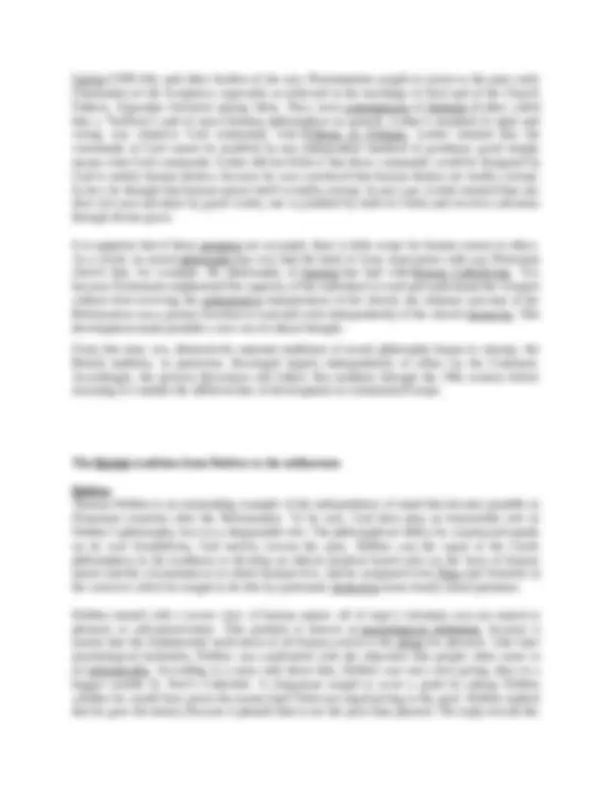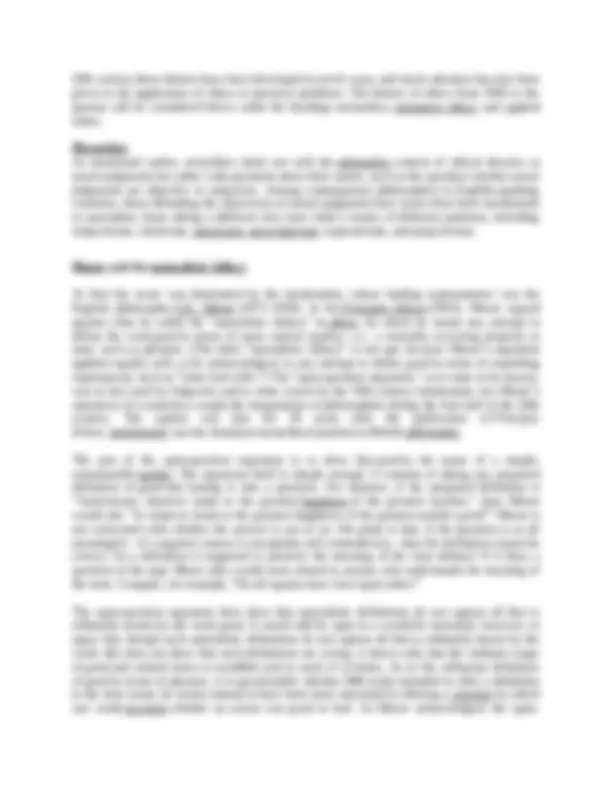


































































Study with the several resources on Docsity

Earn points by helping other students or get them with a premium plan


Prepare for your exams
Study with the several resources on Docsity

Earn points to download
Earn points by helping other students or get them with a premium plan
Community
Ask the community for help and clear up your study doubts
Discover the best universities in your country according to Docsity users
Free resources
Download our free guides on studying techniques, anxiety management strategies, and thesis advice from Docsity tutors
Ethics or moral philosophy is a branch of philosophy that "involves systematizing, defending, and recommending concepts of right and wrong behavior". The field of ethics, along with aesthetics, concerns matters of value; these fields comprise the branch of philosophy called axiology.
Typology: Lecture notes
1 / 72

This page cannot be seen from the preview
Don't miss anything!

































































Introduction The origins of ethics o Mythical accounts Introduction of moral codes Problems of divine origin o Prehuman ethics Nonhuman behaviour Kinship and reciprocity o Anthropology and ethics The history of Western ethics o Ancient civilizations to the end of the 19th century The ancient Middle East and Asia The Middle East India China Ancient and Classical Greece Ancient Greece Socrates Plato Aristotle Later Greek and Roman ethics The Stoics The Epicureans Christian ethics from the New Testament to the Scholastics Ethics in the New Testament St. Augustine St. Thomas Aquinas and the Scholastics The Renaissance and the Reformation Machiavelli The first Protestants The British tradition from Hobbes to the utilitarians Hobbes Early intuitionists: Cudworth, More, and Clarke Shaftesbury and the moral sense school Butler on self-interest and conscience The climax of moral sense theory: Hutcheson and Hume The intuitionist response: Price and Reid Utilitarianism Paley Bentham Mill
Sidgwick The Continental tradition from Spinoza to Nietzsche Spinoza Leibniz Rousseau Kant Hegel Marx Nietzsche o Western ethics from the beginning of the 20th century Metaethics Moore and the naturalistic fallacy Modern intuitionism Emotivism Existentialism Universal prescriptivism Later developments in metaethics Moral realism Kantian constructivism: a middle ground? Irrealist views: projectivism and expressivism Ethics and reasons for action Normative ethics The debate over consequentialism Varieties of consequentialism Objections to consequentialism An ethics of prima facie duties Rawls’s theory of justice Rights theories Natural law ethics Virtue ethics Feminist ethics Ethical egoism Applied ethics Equality Animals Environmental ethics War and peace Abortion, euthanasia, and the value of human life Bioethics
such customs, even if in the end it may have found them wanting. Accordingly, ethics began with the introduction of the first moral codes. Virtually every human society has some form of myth to explain the origin of morality. In the Louvre in Paris there is a black Babylonian column with a relief showing the sun god Shamash presenting the code of laws to Hammurabi (died c. 1750 BCE), known as the Code of Hammurabi. The Hebrew Bible (Old Testament) account of God’s giving the Ten Commandments to Moses (flourished 14th–13th century BCE) on Mount Sinai might be considered another example. In the dialogue Protagoras by Plato (428/427–348/347 BCE), there is an avowedly mythical account of how Zeus took pity on the hapless humans, who were physically no match for the other beasts. To make up for these deficiencies, Zeus gave humans a moral sense and the capacity for law and justice, so that they could live in larger communities and cooperate with one another. That morality should be invested with all the mystery and power of divine origin is not surprising. Nothing else could provide such strong reasons for accepting the moral law. By attributing a divine origin to morality, the priesthood became its interpreter and guardian and thereby secured for itself a power that it would not readily relinquish. This link between morality and religion has been so firmly forged that it is still sometimes asserted that there can be no morality without religion. According to this view, ethics is not an independent field of study but rather a branch of theology ( see moral theology). There is some difficulty, already known to Plato, with the view that morality was created by a divine power. In his dialogue Euthyphro , Plato considered the suggestion that it is divine approval that makes an action good. Plato pointed out that, if this were the case, one could not say that the gods approve of such actions because they are good. Why then do they approve of them? Is their approval entirely arbitrary? Plato considered this impossible and so held that there must be some standards of right or wrong that are independent of the likes and dislikes of the gods. Modern philosophers have generally accepted Plato’s argument, because the alternative implies that if, for example, the gods had happened to approve of torturing children and to disapprove of helping one’s neighbours, then torture would have been good and neighbourliness bad. Problems of divine origin A modern theist ( see theism) might say that, since God is good, God could not possibly approve of torturing children nor disapprove of helping neighbours. In saying this, however, the theist would have tacitly admitted that there is a standard of goodness that is independent of God. Without an independent standard, it would be pointless to say that God is good; this could mean only that God is approved of by God. It seems therefore that, even for those who believe in the existence of God, it is impossible to give a satisfactory account of the origin of morality in terms of divine creation. A different account is needed.
There are other possible connections between religion and morality. It has been said that, even if standards of good and evil exist independently of God or the gods, divine revelation is the only reliable means of finding out what these standards are. An obvious problem with this view is that those who receive divine revelations, or who consider themselves qualified to interpret them, do not always agree on what is good and what is evil. Without an accepted criterion for the authenticity of a revelation or an interpretation, people are no better off, so far as reaching moral agreement is concerned, than they would be if they were to decide on good and evil themselves, with no assistance from religion. Traditionally, a more important link between religion and ethics was that religious teachings were thought to provide a reason for doing what is right. In its crudest form, the reason was that those who obey the moral law will be rewarded by an eternity of bliss while everyone else roasts in hell. In more sophisticated versions, the motivation provided by religion was more inspirational and less blatantly self-interested. Whether in its crude or its sophisticated version, or something in between, religion does provide an answer to one of the great questions of ethics: “Why should I be moral?” ( See below Ethics and reasons for action.) As will be seen in the course of this article, however, the answer provided by religion is not the only one available. Prehuman ethics Nonhuman behaviour Because, for obvious reasons, there is no historical record of a human society in the period before it had any standards of right and wrong, history cannot reveal the origins of morality. Nor is anthropology of any help, because all the human societies that have been studied so far had their own forms of morality (except perhaps in the most extreme circumstances). Fortunately, another mode of inquiry is available. Because living in social groups is a characteristic that humans share with many other animal species—including their closest relatives, the apes— presumably the common ancestor of humans and apes also lived in social groups. Here, then, in the social behaviour of nonhuman animals and in the theory of evolution that explains such behaviour may be found the origins of human morality. Social life, even for nonhuman animals, requires constraints on behaviour. No group can stay together if its members make frequent, unrestrained attacks on each other. With some exceptions, social animals generally either refrain altogether from attacking other members of the social group or, if an attack does take place, do not make the ensuing struggle a fight to the death—it is over when the weaker animal shows submissive behaviour. It is not difficult to see analogies here with human moral codes. The parallels, however, go much further than this. Like humans, social animals may behave in ways that benefit other members of the group at some cost or risk to themselves. Male baboons threaten predators and cover the rear as the troop retreats. Wolves and wild dogs take meat back to members of the pack not present at the kill. Gibbons and chimpanzees with food will, in response to a gesture, share their food with other members of the group. Dolphins support other sick or injured dolphins, swimming under them for hours at a time and pushing them to the surface so they can breathe.
Many features of human morality could have grown out of simple reciprocal practices such as the mutual removal of parasites from awkward places. Suppose a person wanted to have the lice in his hair picked out and was willing in return to remove lice from someone else’s hair. The person must choose his partner carefully. If he helps everyone indiscriminately, he will find himself delousing others without getting his own lice removed. To avoid this, he must learn to distinguish between those who return favours and those who do not. In making this distinction, he would be separating reciprocators from nonreciprocators and, in the process, developing crude notions of fairness and of cheating. He will naturally strengthen his ties to those who reciprocate, and bonds of friendship and loyalty, with a consequent sense of obligation to assist, will result. This is not all. The reciprocators are likely to react in a hostile and angry way to those who do not reciprocate. Perhaps they will regard reciprocity as good and “right” and cheating as bad and “wrong.” From here it is a small step to concluding that the worst of the nonreciprocators should be driven out of society or else punished in some way so that they will not take advantage of others again. Thus, a system of punishment and a notion of just desert constitute the other side of reciprocal altruism. Although kinship and reciprocity loom large in human morality, they do not cover the entire field. Typically, there are obligations to other members of the village, tribe, or nation, even when they are strangers. There may also be a loyalty to the group as a whole that is distinct from loyalty to individual members of the group. It may be at this point that human culture intervenes. Each society has a clear interest in promoting devotion to the group and can be expected to develop cultural influences that exalt those who make sacrifices for the sake of the group and revile those who put their own interests too far ahead. More tangible rewards and punishments may supplement the persuasive effect of social opinion. This is the start of a process of cultural development of moral codes. Research in psychology and the neurosciences has thrown light on the role of specific parts of the brain in moral judgment and behaviour, suggesting that emotions are strongly involved in moral judgments, particularly those that are formed rapidly and intuitively. These emotions could be the result of social and cultural influences, or they could have a biological basis in the evolutionary history of the human species; such a basis would continue to exert some influence even if social and cultural forces pulled in different directions. Some of this research, however, also indicates that people sometimes use reasoning processes to reach moral judgments that contradict their usual intuitive responses. Anthropology and ethics Many people believe that there are no moral universals—i.e., that there is so much variation from one culture to another that no single moral principle or judgment is generally accepted. It has already been shown that this is not the case. Of course, there are immense differences in the way in which the broad principles so far discussed are applied. The duty of children to their parents meant one thing in traditional Chinese society and means something quite different in contemporary Western societies. Yet, concern for kin and reciprocity are considered good in virtually all human societies. Also, all societies have, for obvious reasons, some constraints on killing and wounding other members of the group.
Christianity: Ethics: obeying the truth Christians acknowledge not only a duty to announce the gospel, profess the faith, and worship God but also to live their entire lives according… Beyond this common ground, the variations in moral attitudes soon become more striking than the similarities. Man’s fascination with such variations goes back a long way. The Greek historian Herodotus (died 430–420 BCE) relates that the Persian king Darius I (550–486 BCE) once summoned some Greeks before him and asked them how much he would have to pay them to eat their fathers’ dead bodies. They refused to do it at any price. Then he summoned some Indians who by custom ate the bodies of their parents and asked them what would make them willing to burn their fathers’ bodies. The Indians cried out that he should not mention so horrid an act. Herodotus drew the obvious moral: each nation thinks its own customs best. Variations in morals were not systematically studied until the 19th century, when Western knowledge of the more remote parts of the globe began to increase. In The Origin and Development of the Moral Ideas (1906–08), the Finnish anthropologist Edward Westermarck (1862–1939) compared differences between societies in matters such as the wrongness of killing (including killing in warfare, euthanasia, suicide, infanticide, abortion, human sacrifice, and duelling); the duty to support children, the aged, or the poor; forms of permissible sexual relationship; the status of women; the right to property and what constitutes theft; the holding of slaves; the duty to tell the truth; dietary restrictions; concern for nonhuman animals; duties to the dead; and duties to the gods. Westermarck had no difficulty in demonstrating tremendous diversity in what different societies considered good conduct in all these areas. More recent, though less comprehensive, studies have confirmed that human societies can and do flourish while holding radically different views about all such matters—though of course various groups within a society may do less well under some sets of beliefs than others. As noted above, ethics itself is not primarily concerned with the description of the moral systems of different societies. That task, which remains on the level of description, is one for anthropology or sociology. In contrast, ethics deals with the justification of moral principles (or with the impossibility of such a justification). Nevertheless, ethics must take note of the variations in moral systems, because it has often been claimed that this variety shows
The earliest surviving writings that might be taken as ethics textbooks are a series of lists of precepts to be learned by boys of the ruling class of Egypt, prepared some 3,000 years before the Christian Era. In most cases, they consist of shrewd advice on how to live happily, avoid unnecessary troubles, and advance one’s career by cultivating the favour of superiors. There are, however, several passages that recommend more broadly based ideals of conduct, such as the following: rulers should treat their people justly and judge impartially between their subjects; they should aim to make their people prosperous; those who have bread should share it with the hungry; humble and lowly people must be treated with kindness; one should not laugh at the blind or at dwarfs. Why, then, should one follow these precepts? Did the ancient Egyptians believe that one should do what is good for its own sake? The precepts frequently state that it will profit a man to act justly, as in the maxim “Honesty is the best policy.” They also emphasize the importance of having a good name. These precepts were intended for the instruction of the ruling classes, however, and it is not clear why helping the destitute should have contributed to an individual’s good reputation among this class. To some degree, therefore, the authors of the precepts must have thought that to make people prosperous and happy and to be kind to those who have least is not merely personally advantageous but good in itself. The precepts are not works of ethics in the philosophical sense. No attempt is made to find any underlying principles of conduct that might provide a more systematic understanding of ethics. Justice, for example, is given a prominent place, but there is no elaboration of the notion of justice or any discussion of how disagreements about what is just and unjust might be resolved. Furthermore, there is no probing of ethical dilemmas that may occur if the precepts should conflict with one another. The precepts are full of sound observations and practical wisdom, but they do not encourage theoretical speculation. The same practical bent can be found in other early codes or lists of ethical injunctions. The great Code of Hammurabi is often said to have been based on the principle of “an eye for an eye, a tooth for a tooth,” as if this were some fundamental principle of justice, elaborated and applied to all cases. In fact, the code reflects no such consistent principle. It frequently prescribes the death penalty for offenses that do not themselves cause death—e.g., for robbery and for accepting bribes. Moreover, even the eye-for-an-eye rule applies only if the eye of the original victim is that of a member of the patrician class; if it is the eye of a commoner, the punishment is a fine of a quantity of silver. Apparently such differences in punishment were not thought to require justification. At any rate, there are no surviving attempts to defend the principles of justice on which the code was based. The Hebrew people were at different times captives of both the Egyptians and the Babylonians. It is therefore not surprising that the law of ancient Israel, which was put into its definitive form during the Babylonian Exile, shows the influence both of the ancient Egyptian precepts and of the Code of Hammurabi. The book of Exodus refers, for example, to the principle of “life for life, eye for eye, tooth for tooth.” Hebraic law does not differentiate, as the Babylonian law does, between patricians and commoners, but it does stipulate that in several respects foreigners may be treated in ways that it is not permissible to treat fellow Hebrews; for instance, Hebrew slaves, but not others, had to be freed without ransom in the seventh year. Yet, in other respects Hebraic
law and morality developed the humane concern shown in the Egyptian precepts for the poor and unfortunate: hired servants must be paid promptly, because they rely on their wages to satisfy their pressing needs; slaves must be allowed to rest on the seventh day; widows, orphans, and the blind and deaf must not be wronged; and the poor man should not be refused a loan. There was even a tithe providing for an incipient welfare state. The spirit of this humane concern was summed up by the injunction to “love thy neighbour as thyself,” a sweepingly generous form of the rule of reciprocity. The famed Ten Commandments are thought to be a legacy of Semitic tribal law from a time when important commands were taught one for each finger, so that they could be remembered more easily (sets of five or 10 laws are common among preliterate civilizations). The content of the Hebrew commandments differed from other laws of the region mainly in its emphasis on duties to God. This emphasis persisted in the more detailed laws laid down elsewhere; as much as half of such legislation was concerned with crimes against God and ceremonial and ritualistic matters, though there may be other explanations for some of these ostensibly religious requirements concerning the avoidance of certain foods and the need for ceremonial cleansings. In addition to lengthy statements of the law, the surviving literature of ancient Israel includes both proverbs and the books of the prophets. The proverbs, like the precepts of the Egyptians, are brief statements that do not demonstrate much concern for systematic presentation or overall coherence. They go farther than the Egyptian precepts, however, in urging conduct that is just and upright and pleasing to God. There are correspondingly fewer references to what is needed for a successful career, though it is frequently stated that God rewards the just. In this connection, the Book of Job is notable as an exploration of the problem raised for those who accept this motive for obeying the moral law: why do the best of people frequently suffer the worst misfortunes? The book offers no solution beyond faith in God, but the sharpened awareness of the problem it offers may have influenced some to adopt the belief in reward and punishment in another realm as the only possible solution. The literature of the prophets contains a good deal of social and moral criticism, though most of it consists of denunciation rather than discussion about what goodness really is or why there should be so much wrongdoing. The Book of Isaiah is especially notable for its early portrayal of a utopia in which “the desert shall blossom as the rose…the wolf also shall dwell with the lamb. …They shall not hurt or destroy in all my holy mountain.” India Unlike the ethical teachings of ancient Egypt and Babylonia, Indian ethics was philosophical from the start. In the oldest of the Indian writings, the Vedas, ethics is an integral aspect of philosophical and religious speculation about the nature of reality. These writings date from about 1500 to 1200 BCE. They have been described as the oldest philosophical literature in the world, and what they say about how people ought to live may therefore be the first philosophical ethics. ( See Indian philosophy.) The Vedas are, in a sense, hymns, but the gods to which they refer are not persons but manifestations of ultimate truth and reality. In the Vedic philosophy, the basic principle of the universe, the ultimate reality on which the cosmos exists, is the principle of rita , which is the
Other moral duties are also derived from the notion of nonviolence. To tell someone a lie, for example, is regarded as inflicting a mental injury on that person. Stealing, of course, is another form of injury, but because of the absence of a distinction between acts and omissions, even the possession of wealth is seen as depriving the poor and hungry of the means to satisfy their wants. Thus, nonviolence leads to a principle of nonpossession of property. Jain priests were expected to be strict ascetics and to avoid sexual intercourse. Ordinary Jains, however, followed a slightly less-severe code, which was intended to give effect to the major forms of nonviolence while still being compatible with a normal life. The other great ethical system to develop as a reaction to the ossified form of the old Vedic philosophy was Buddhism. The person who became known as the Buddha (flourished c. 6th–4th century BCE), which means the “enlightened one,” was born the son of a king. Until he was 29 years old, he lived the sheltered life of a typical prince, with every luxury he could desire. At that time, legend has it, he was jolted out of his idleness by the “Four Signs”: he saw in succession an old man, a sick person, a corpse being carried to cremation, and a monk in meditation beneath a tree. He began to think about old age, disease, and death, and decided to follow the way of the monk. For six years he led an ascetic life of renunciation, but finally, while meditating under a tree, he concluded that the solution was not withdrawal from the world, but rather a practical life of compassion for all. Buddha Head of Buddha in gray schist, 1st–3rd century CE, showing Hellenistic influences, from Gandhara, northwestern Pakistan; in the Guimet Museum, Paris. Sailko Buddhism is conventionally regarded as a religion, and indeed over the centuries it adopted religious trappings in many places. This is an irony of history, however, because the Buddha himself was a strong critic of religion. He rejected the authority of the Vedas and refused to set up an alternative creed. He regarded religious ceremonies as a waste of time and theological beliefs as mere superstition. He refused to discuss abstract metaphysical problems such as the immortality of the soul. The Buddha told his followers to think for themselves and to take responsibility for their own future. In place of religious beliefs and religious ceremonies, the Buddha advocated a life devoted to universal compassion and brotherhood. Through such a life one might reach the ultimate goal, nirvana, a state in which all living things are free from pain and sorrow. There are similarities between this morality of universal compassion and the ethics of the Jains. In keeping with his own previous experience, the Buddha proposed a “middle path” between self-indulgence and self-renunciation. In fact, it is not so much a path between these two extremes as one that draws together the benefits of both. Through living a life of compassion and love for all, a person achieves the liberation from selfish cravings sought by the ascetic and a serenity and satisfaction that are more fulfilling than anything obtained by indulgence in pleasure. It is sometimes thought that because the Buddhist goal is nirvana, a state that can be reached by meditation, Buddhism teaches a withdrawal from the real world. Nirvana, however, is not to be sought for oneself alone; it is regarded as a unity of the individual self with the universal self in which all things take part. In the Mahayana school of Buddhism, the aspirant to enlightenment
even takes a vow to become a bodhisattva (buddha-to-be) and not to accept final release until everything that exists in the universe has attained nirvana. The Buddha lived and taught in India, and so Buddhism is properly classified as an Indian moral philosophy. Yet Buddhism did not permanently take hold in the land of its origin. Instead, it spread in different forms south into Sri Lanka and Southeast Asia and north through Tibet to China, Korea, and Japan. In the process, Buddhism suffered the same fate as the Vedic philosophy against which it had rebelled: it became a religion, often rigid, with its own sects, ceremonies, and superstitions. China The two greatest moral philosophers of ancient China, Laozi (flourished c. 6th century BCE) and Confucius (Kongfuzi, or Kongzi; 551–479 BCE), thought in very different ways. Laozi is best known for his ideas about the Dao (literally “Way,” the Supreme Principle). The Dao is based on the traditional Chinese virtues of simplicity and sincerity. To follow the Dao is a matter not of observing any set of duties or prohibitions but rather of living in a simple and honest manner, being true to oneself, and avoiding the distractions of ordinary living. Laozi’s classic book on the Dao, Daodejing , consists only of aphorisms and isolated paragraphs, making it difficult to draw an intelligible system of ethics from it. Perhaps this is because Laozi was a type of moral skeptic: he rejected both righteousness and benevolence, apparently because he saw them as imposed on individuals from without rather than coming from their own inner natures. Like the Buddha, Laozi found the things prized by the world—rank, luxury, and glamour—to be empty and worthless when compared with the ultimate value of a peaceful inner life. He also emphasized gentleness, calm, and nonviolence. Nearly 600 years before Jesus, he said: “It is the way of the Dao…to recompense injury with kindness.” By returning good for good and also good for evil, Laozi believed that all would become good; to return evil for evil would lead to chaos. The lives of Laozi and Confucius overlapped, and there is even an account of a meeting between them, which is said to have left the younger Confucius baffled. Confucius was the more down- to-earth thinker, absorbed in the practical task of social reform. The province in which he served as minister of justice became renowned for the honesty of its people, the respect shown to the aged, and the care taken of the poor. Probably because of their practical nature, the teachings of Confucius had a far greater influence on China than did those of the more withdrawn Laozi. Confucius did not organize his recommendations into any coherent system. His teachings are offered in the form of sayings, aphorisms, and anecdotes, usually in reply to questions by disciples. They aim at guiding the student toward becoming a junzi , a concept translated as “gentleman” or “superior man.” In opposition to the prevailing feudal ideal of the aristocratic lord, Confucius presented the superior man as one who is humane and thoughtful, motivated by the desire to do what is good rather than by personal profit. Beyond this, however, the concept is not discussed in any detail; it is only shown by diverse examples, some of them trite: “A superior man’s life leads upwards.…The superior man is broad and fair; the inferior man takes sides and is petty.…A superior man shapes the good in man; he does not shape the bad in him.” One of the recorded sayings of Confucius is an answer to a request from a disciple for a single word that could serve as a guide to conduct for one’s entire life. He replied: “Is
mercenaries who taught their students to win arguments by fair means or foul. Aristotle said that Protagoras ( c. 490– c. 420 BCE), perhaps the most famous of the Sophists, claimed to teach how “to make the weaker argument the stronger.” The Sophists, however, were more than mere teachers of rhetorical tricks. They regarded themselves as imparters of the cultural and intellectual qualities necessary for success, and their involvement with argument about practical affairs naturally led them to develop views about ethics. The recurrent theme in the views of the better-known Sophists, such as Protagoras, Antiphon ( c. 480–411 BCE), and Thrasymachus (flourished late 5th century BCE), is that what is commonly called good and bad or just and unjust does not reflect any objective fact of nature but is rather a matter of social convention. Protagoras is the apparent author of the celebrated epigram summing up this theme, “Man is the measure of all things.” Plato represents him as saying, “Whatever things seem just and fine to each city, are just and fine for that city, so long as it thinks them so.” Protagoras, like Herodotus, drew a moderate conclusion from his ethical relativism. He argued that, while the particular content of the moral rules may vary, there must be rules of some kind if life is to be tolerable. Thus, Protagoras stated that the foundations of an ethical system needed nothing from the gods or from any special metaphysical realm beyond the ordinary world of the senses. Thrasymachus appears to have taken a more radical approach—if Plato’s portrayal of his views is historically accurate. He explained that the concept of justice means nothing more than obedience to the laws of society, and, since these laws are made by the strongest political group in its own interest, justice represents nothing but the interest of the stronger. This position is often represented by the slogan “Might makes right.” Thrasymachus was probably not saying, however, that whatever the mightiest do really is right; he is more likely to have been denying that the distinction between right and wrong has any objective basis. Presumably he would then encourage his pupils to follow their own interests as best they could. He is thus an early representative of moral skepticism and perhaps ethical egoism, the view that the right thing to do is to pursue one’s own interest ( see below Ethical egoism). It is not surprising that, with ideas of this sort in circulation, other thinkers should react by probing more deeply into ethics to see whether the potentially destructive conclusions of some of the Sophists could be resisted. This reaction produced works that have served ever since as the cornerstone of the entire edifice of Western ethics. Socrates Socrates, who once observed that “the unexamined life is not worth living,” must be regarded as one of the greatest teachers of ethics. Yet, unlike other figures of comparable importance, such as the Buddha or Confucius, he did not tell his audience how they should live. What Socrates taught was a method of inquiry. When the Sophists or their pupils boasted that they knew what justice, piety, temperance, or law was, Socrates would ask them to give an account, which he would then show was entirely inadequate. Because his method of inquiry threatened conventional beliefs, Socrates’ enemies contrived to have him put to death on a charge of corrupting the youth of Athens. For those who thought that adherence to the conventional moral code was more important than the cultivation of an inquiring mind, the charge was appropriate. By conventional standards, Socrates was indeed corrupting the youth of Athens, though he himself considered the destruction of beliefs that could not stand up to criticism as a necessary preliminary to the search
for true knowledge. In this respect he differed from the Sophists, with their ethical relativism, for he thought that virtue is something that can be known and that the virtuous person is the one who knows what virtue is. It is therefore not entirely accurate to regard Socrates as contributing a method of inquiry but as having no positive views of his own. He believed that virtue could be known, though he himself did not profess to know it. He also thought that anyone who knows what virtue is will necessarily act virtuously. Those who act badly, therefore, do so only because they are ignorant of, or mistaken about, the real nature of virtue. This belief may seem peculiar today, in large part because it is now common to distinguish between what a person ought to do and what is in his own interest. Once this assumption is made, it is easy to imagine circumstances in which a person knows what he ought to do but proceeds to do something else—what is in his own interests—instead. Indeed, how to provide self-interested (or merely rational) people with motivating reasons for doing what is right has been a major problem for Western ethics. In ancient Greece, however, the distinction between virtue and self-interest was not made—at least not in the clear-cut manner that it is today. The Greeks believed that virtue is good both for the individual and for the community. To be sure, they recognized that living virtuously might not be the best way to prosper financially; but then they did not assume, as people are prone to do today, that material wealth is a major factor in whether a person’s life goes well or ill. Plato Socrates’ greatest disciple, Plato, accepted the key Socratic beliefs in the objectivity of goodness and in the link between knowing what is good and doing it. He also took over the Socratic method of conducting philosophy, developing the case for his own positions by exposing errors and confusions in the arguments of his opponents. He did this by writing his works as dialogues in which Socrates is portrayed as engaging in argument with others, usually Sophists. The early dialogues are generally accepted as reasonably accurate accounts of the views of the historical Socrates, but the later ones, written many years after Socrates’ death, use the latter as a mouthpiece for ideas and arguments that were in fact original to Plato. In the most famous of Plato’s dialogues, Politeia ( The Republic ), the character Socrates is challenged by the following example: Suppose a person obtained the legendary ring of Gyges, which has the magical property of rendering the wearer invisible. Would that person still have any reason to behave justly? Behind this challenge lies the suggestion, made by the Sophists and still heard today, that the only reason for acting justly is that one cannot get away with acting unjustly. Plato’s response to this challenge is a long argument developing a position that appears to go beyond anything the historical Socrates asserted. Plato maintained that true knowledge consists not in knowing particular things but in knowing something general that is common to all the particular cases. This view is obviously derived from the way in which Socrates pressed his opponents to go beyond merely describing particular acts that are (for example) good, temperate, or just and to give instead a general account of goodness, temperance, or justice. The implication is that one does not know what goodness is unless one can give such a general account. But the question then arises, what is it that one knows when one knows this general idea of goodness? Plato’s answer is that one knows the Form of the Good, a perfect, eternal, and changeless entity existing outside space and time, in which particular good things share, or “participate,” insofar as they are good.
Plato founded a school of philosophy in Athens known as the Academy. There Aristotle, Plato’s younger contemporary and only rival in terms of influence on the course of Western philosophy, went to study. Aristotle was often fiercely critical of Plato, and his writing is very different in style and content, but the time they spent together is reflected in a considerable amount of common ground. Thus, Aristotle holds with Plato that the life of virtue is rewarding for the virtuous as well as beneficial for the community. Aristotle also agrees that the highest and most satisfying form of human existence involves the exercise of one’s rational faculties to the fullest extent. One major point of disagreement concerns Plato’s doctrine of Forms, which Aristotle rejected. Thus, Aristotle does not argue that in order to be good one must have knowledge of the Form of the Good. Aristotle conceived of the universe as a hierarchy in which everything has a function. The highest form of existence is the life of the rational being, and the function of lower beings is to serve this form of life. From this perspective Aristotle defended slavery—because he considered barbarians less rational than Greeks and by nature suited to be “living tools”—and the killing of nonhuman animals for food and clothing. From this perspective also came a view of human nature and an ethical theory derived from it. All living things, Aristotle held, have inherent potentialities, which it is their nature to develop. This is the form of life properly suited to them and constitutes their goal. What, however, is the potentiality of human beings? For Aristotle this question turns out to be equivalent to asking what is distinctive about human beings; and this, of course, is the capacity to reason. The ultimate goal of humans, therefore, is to develop their reasoning powers. When they do this, they are living well, in accordance with their true nature, and they will find this the most rewarding existence possible. Aristotle thus ends up agreeing with Plato that the life of the intellect is the most rewarding existence, though he was more realistic than Plato in suggesting that such a life would also contain the goods of material prosperity and close friendships. Aristotle’s argument for regarding the life of the intellect so highly, however, is different from Plato’s, and the difference is significant because Aristotle committed a fallacy that has often been repeated. The fallacy is to assume that whatever capacity distinguishes humans from other beings is, for that very reason, the highest and best of their capacities. Perhaps the ability to reason is the best human capacity, but one cannot be compelled to draw this conclusion from the fact that it is what is most distinctive of the human species. A broader and still more pervasive fallacy underlies Aristotle’s ethics. It is the idea that an investigation of human nature can reveal what one ought to do. For Aristotle, an examination of a knife would reveal that its distinctive capacity is to cut, and from this one could conclude that a good knife is a knife that cuts well. In the same way, an examination of human nature should reveal the distinctive capacity of human beings, and from this one should be able to infer what it is to be a good human being. This line of thought makes sense if one thinks, as Aristotle did, that the universe as a whole has a purpose and that human beings exist as part of such a goal-directed scheme of things, but its error becomes glaring if this view is rejected and human existence is seen as the result of a blind process of evolution. Whereas the distinctive capacity of a knife is a result of the fact that knives are made for a specific purpose—and a good knife is thus one that fulfills this purpose well—human beings, according to modern biology, were not made with any particular purpose in mind. Their nature is the result of random forces of natural selection. Thus,
human nature cannot, without further moral premises, determine how human beings ought to live. Aristotle is also responsible for much later thinking about the virtues one should cultivate. In his most important ethical treatise, the Nicomachean Ethics , he sorts through the virtues as they were popularly understood in his day, specifying in each case what is truly virtuous and what is mistakenly thought to be so. Here he applies an idea that later came to be known as the Golden Mean; it is essentially the same as the Buddha’s middle path between self-indulgence and self- renunciation. Thus, courage, for example, is the mean between two extremes: one can have a deficiency of it, which is cowardice, or one can have an excess of it, which is foolhardiness. The virtue of friendliness, to give another example, is the mean between obsequiousness and surliness. Aristotle does not intend the idea of the mean to be applied mechanically in every instance: he says that in the case of the virtue of temperance, or self-restraint, it is easy to find the excess of self-indulgence in the physical pleasures, but the opposite error, insufficient concern for such pleasures, scarcely exists. (The Buddha, who had experienced the ascetic life of renunciation, would not have agreed.) This caution in the application of the idea is just as well, for while it may be a useful device for moral education, the notion of a mean cannot help one to discover new truths about virtue. One can determine the mean only if one already has a notion of what is an excess and what is a defect of the trait in question. But this is not something that can be discovered by a morally neutral inspection of the trait itself: one needs a prior conception of the virtue in order to decide what is excessive and what is defective. Thus, to attempt to use the doctrine of the mean to define the particular virtues would be to travel in a circle. Aristotle’s list of the virtues and vices differs from lists compiled by later Christian thinkers. Although courage, temperance, and liberality are recognized as virtues in both periods, Aristotle also includes a virtue whose Greek name, megalopsyche , is sometimes translated as “pride,” though it literally means “greatness of soul.” This is the characteristic of holding a justified high opinion of oneself. For Christians the corresponding excess, vanity, was a vice, but the corresponding deficiency, humility, was a virtue. Aristotle’s discussion of the virtue of justice has been the starting point of almost all Western accounts. He distinguishes between justice in the distribution of wealth or other goods and justice in reparation, as, for example, in punishing someone for a wrong he has done. The key element of justice, according to Aristotle, is treating like cases alike—an idea that set for later thinkers the task of working out which kinds of similarities (e.g., need, desert, talent) should be relevant. As with the notion of virtue as a mean, Aristotle’s conception of justice provides a framework that requires fleshing out before it can be put to use. Aristotle distinguished between theoretical and practical wisdom. His conception of practical wisdom is significant, for it involves more than merely choosing the best means to whatever ends or goals one may have. The practically wise person also has the right ends. This implies that one’s ends are not purely a matter of brute desire or feeling; the right ends are something that can be known and reasoned about. It also gives rise to the problem that faced Socrates: How is it that people can know the difference between good and bad and still choose what is bad? As mentioned earlier, Socrates simply denied that this could happen, saying that those who did not choose the good must, appearances notwithstanding, be ignorant of what the good is. Aristotle said that this view was “plainly at variance with the observed facts,” and he offered instead a